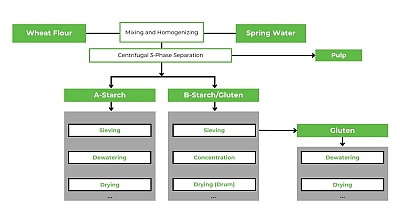ORGANIC PRODUCTION
At KRÖNER-STÄRKE, only wheat flours with defined properties and our own spring water are used for the industrial production of wheat starch and wheat gluten. The separation process of the flour ingredients is based on purely physical principles that are used technologically. In the continuous production, a water-flour mixture is separated in a decanter centrifuge into the fractions A-starch and gluten and B-starch. The B-starch is washed out of the soft, rubbery gluten and sieved off. The wet products are cleaned, mechanically dewatered and thermally dried.

Organic Starch Production Process (A-Starch)
The organic starch is diluted with fresh water, refined, thickened in a large-capacity centrifuge and then gently dried and ground in a hot air stream to a maximum water content of 13%.
Production Process of Organic Pregelatinized Starch (B-Starch)
The organic swelling starch is thickened, digested on steam-heated rollers, dried and then ground. The pulping process gives the product its characteristic cold swelling properties.
Production Process of Wheat Gluten
The organic wheat gluten is dewatered using dewatering screws, gently dried in a circulating air dryer and then ground. The resulting powdery product retains its natural viscoelastic properties.
Before each organic production phase, the entire production area and all tools are thoroughly cleaned. This means that contact between organic and conventional products can be ruled out. So that organic really remains organic.
Organic cereal flours and organic cereal starches are processed into organic pregelatinized flours and organic pregelatinized starches with characteristic cold-swelling properties by means of physical pulping using roller drying .
The extrusion process is used to break down various organic flours and organic starch products individually or in organic mixtures by purely physical means. After the addition of spring water, the selected organic raw material is plasticized in a cylinder under the influence of pressure and temperature and with the help of shearing and kneading forces. The heat treatment (cooking process) within the extrusion cylinder denatures the proteins and gelatinizes the organic starch. Microorganisms and naturally occurring enzymes are largely killed or inactivated. When the product leaves the extrusion cylinder, the added water evaporates due to a sudden reduction in pressure. The dried product is then ground.
Compared to native organic flours, extruded and roller-dried organic flours have a pronounced thickening behavior at room temperature, for example. Due to the cooking process, they are easily digestible and are food within the meaning of German food law.

